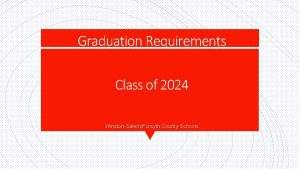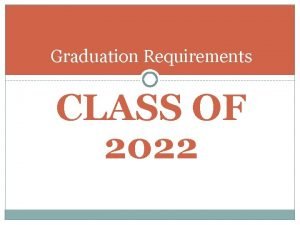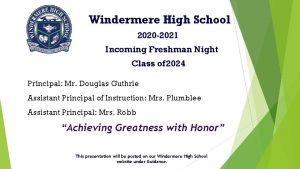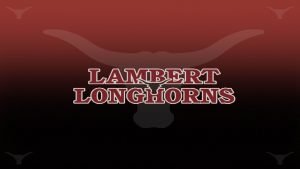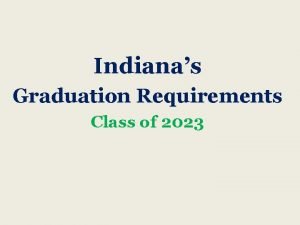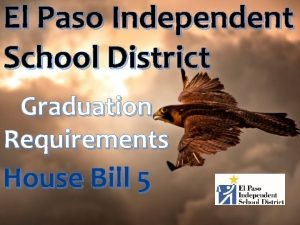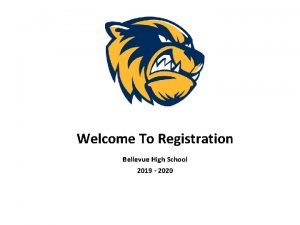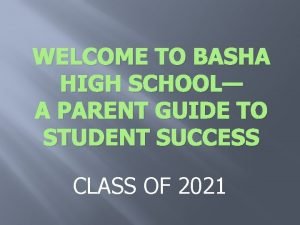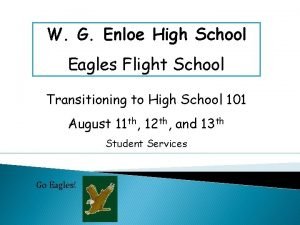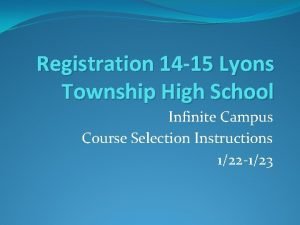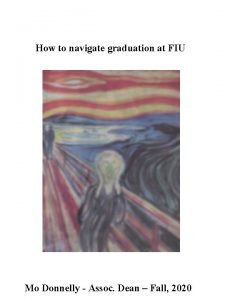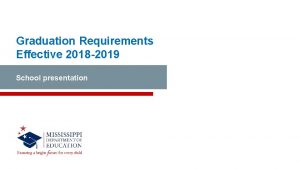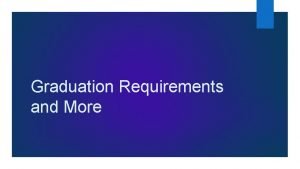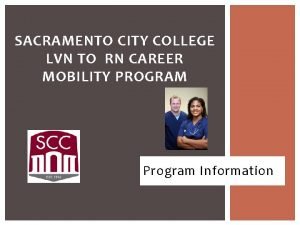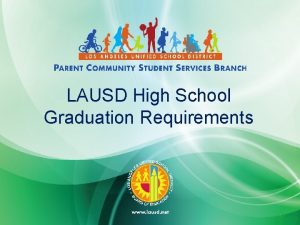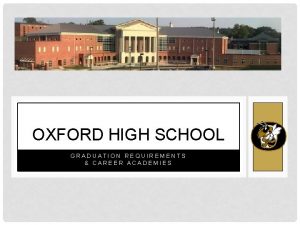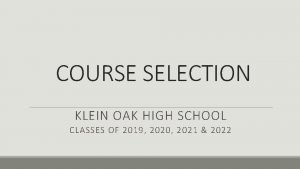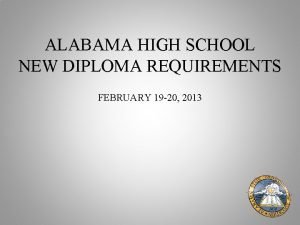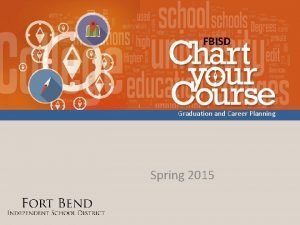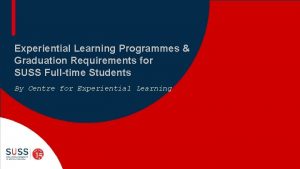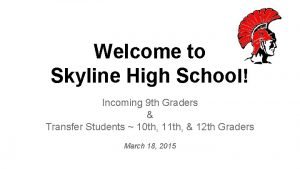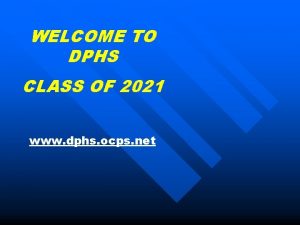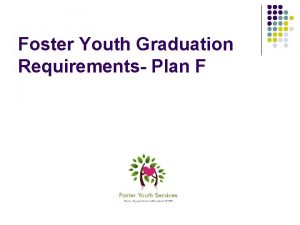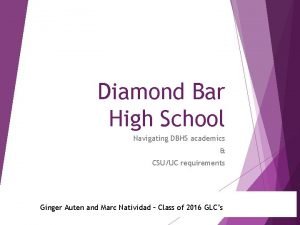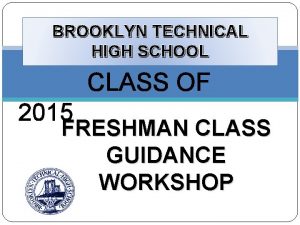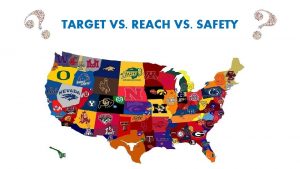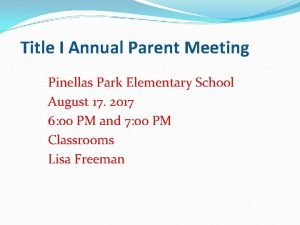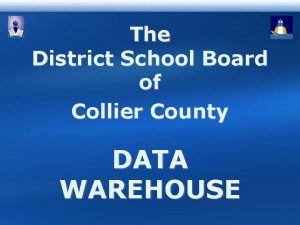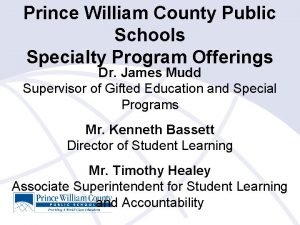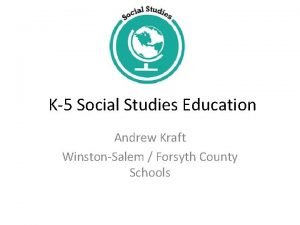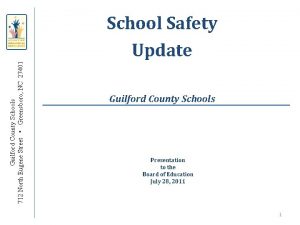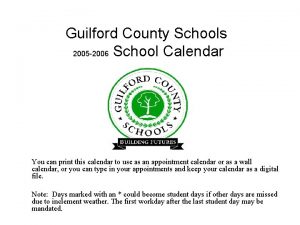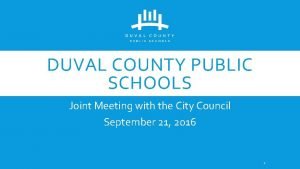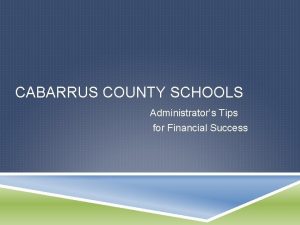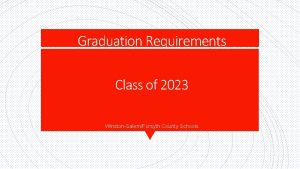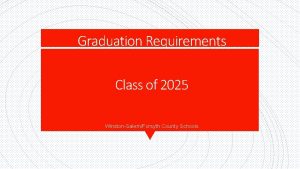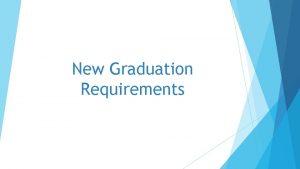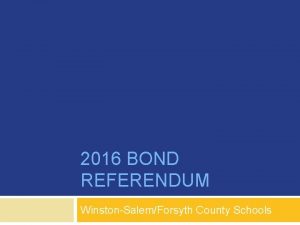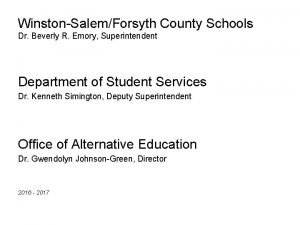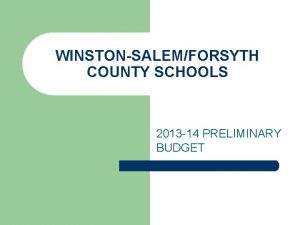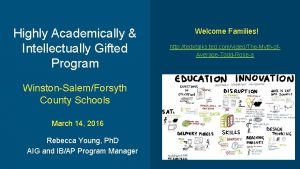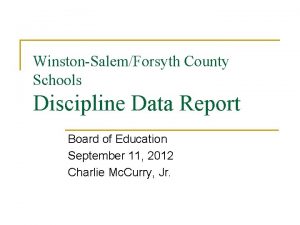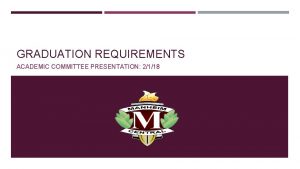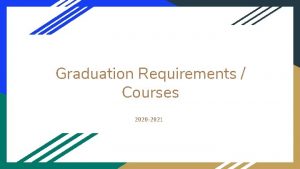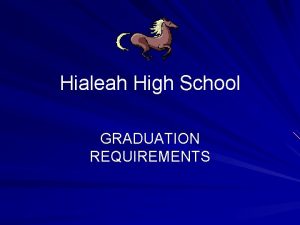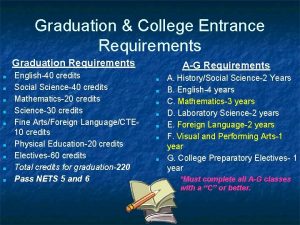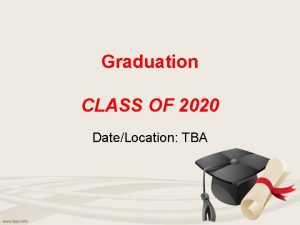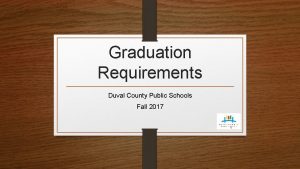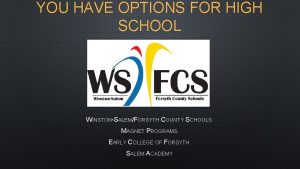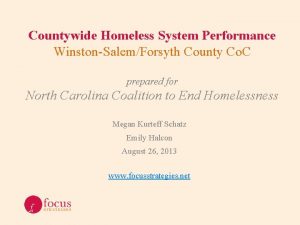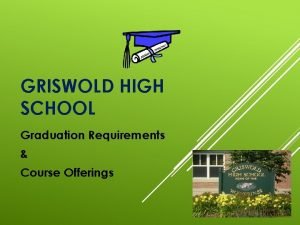Graduation Requirements Class of 2016 WinstonSalemForsyth County Schools







































- Slides: 39

Graduation Requirements Class of 2016 Winston-Salem/Forsyth County Schools

Graduation Requirements • Class of 2016 • Entering 9 th grade 2012 – 2013 • Course of Study Requirements – Future-Ready Core – Occupational Prep

State Board of Education’s Mission FUTURE-READY STUDENTS FOR THE 21 ST CENTURY Every public school student will graduate from high school, globally competitive for work and postsecondary education and prepared for life in the 21 st century.

Source: State of North Carolina Department of Public Instruction July 2008

American Diploma Project (ADP) Network 35 STATES COMMITTED TO IMPROVING STUDENT PREPARATION

Future-Ready Students • Increased graduation requirements are intended to impact the educational pipeline • Recent survey found that 40% of college faculty feel that first-year students are academically unprepared for college-level courses

NORTH CAROLINA’S Educational Pipeline In North Carolina, for every 100 ninth-grade students… … 75 students graduate four years later. … 41 students enter college. … 28 students are still enrolled in their second year. … 19 students graduate with either an Associate’s degree within three years or a Bachelor’s degree within six years. Source: www. achieve. org

NORTH CAROLINA’S Educational Pipeline In WSFCS, for every 100 ninth-grade students… … 78 students graduate four years later (Class of 2011) …. approximately 55 students enter 4 year colleges …. . 18 -20 enroll in 2 yr colleges Source: www. achieve. org

College Ready = Work Ready • American College Test (ACT) Study Ready for College, Ready for Work: Same or Different? – Whether planning to enter college or workforce training programs after graduation, high school students need to be educated in a comparable level of readiness in reading and mathematics.

When asked, the majority of high school graduates would have taken harder courses KNOWING WHAT YOU KNOW TODAY ABOUT THE EXPECTATIONS OF COLLEGE/WORK… Would have taken more challenging courses in at least one area? Source: Peter D. Hart Research Associates/Public Opinion Strategies, Rising to the Challenge: Are High School Graduates Prepared for College and Work? prepared for Achieve, Inc. , 2005.

Would have taken more challenging courses in: Math Science English SOURCE: Peter D. Hart Research Associates/Public Opinion Strategies, Rising to the Challenge: Are High School Graduates Prepared for College and Work? prepared for Achieve, Inc. , 2005.

Future-Ready Workers • Approximately 40% of employers feel that high school graduates entering the workforce do not have the skills to advance.

Which is More Difficult? War and Peace or Auto Mechanics Journal?

Skilled Person 1952 Six or more years of school (US Census Bureau) 1960 Eighth-grade education (US Office of Education) 21 st Century High school education plus (US Education | The Conference Board)

Technical Jobs Require High-level Skills • Technicians in the telecommunications industry: – Recommended high school content includes Geometry and Advanced Algebra • Electricians: – Recommended high school content includes Algebra, Geometry, Trigonometry, and Physics

Future –Ready Core Course of Study Course and Credit Requirements

Future-Ready Core Course of Study • • • 4 English 4 math 4 social studies 4 science 2 PE/Health/LMS • 2 electives (electives must be any combination of Career Technical Education, Arts Education or Second Language) • 2 additional electives ( from CTE, JROTC, Arts Education or any other subject area) • Total = 22 credits

Future-Ready Core Course of Study • Student course selections should be based on their postsecondary plans. – Work or Military – Community College – Four year College or University

Future-Ready Core English • English I, III, and IV required • Levels include regular, honors, seminar, AP, and IB

Future-Ready Core Science • Biology • Earth/Environmental • A physical science (e. g. Chemistry) • One additional science (Levels include regular, honors, AP, and IB)

Future-Ready Core Social Studies • World History • Civics and Economics • American History I and II or AP U. S. History or IB History of the Americas and one additional course (Levels include regular, honors, seminar, AP, and IB)

Future-Ready Core Math • Four mathematics credits are required • Algebra I, Geometry, Algebra II or Integrated Math I, III • And a fourth math course to be aligned with the student's after high school plans (e. g. college or work). • Many options exist. Please talk to your teachers and counselors.

Future-Ready Core Math Sequence 1 2 Algebra I + 3 Geometry + Eligible for UNC System Algebra II Courses such as… 4 + or 1 2 Integrated I + 3 Integrated II + 4 th Math Advanced Functions or Discrete Math Pre-Calculus Integrated Math IV AP Calculus Integrated III Eligible for comm. college Courses such as… In rare instances, students will be exempted from the Future-Ready Core math sequence. In cases where parents, teachers, counselors, principals and the students believe a different path is appropriate, the student will take the following sequence… Accounting II Drafting II Substitution Math Sequence 1 Algebra I Or Integrated I 2 3 Geometry or Integrated II Advanced Functions or Discrete Math 4 Applied Math II Future-Ready Core

Mathematics Sequences Math I Workforce Algebra I Math II Geometry Math III Algebra II Math IV Advanced Functions and Modeling Discrete Math -or- Integrated Math III -or. Integrated Math IV

Mathematics Sequences Math I Community College Math III Algebra I Geometry Algebra II - or Integrated Math II - or – Integrated Math III Math IV Pre-Calculus Discrete Math Advanced Functions and Modeling - or Integrated Math IV - or Selected Community College Courses (MAT)

Mathematics Sequences College or University Math III Math IV Algebra I - or Integrated Math I Geometry - or Integrated Math II Algebra II - or Integrated Math III Geometry Algebra II Pre-Calculus Advanced Functions and Modeling - or – Discrete Math -or. Pre-Calculus –or. Integrated Math IV - or AP Calculus AB - or AP Calculus BC - or – AP Statistics

Future –Ready Core Course of Study Elective Options

Electives • Students must complete four elective credits to satisfy WS/FCS graduation requirements. • 2 electives must be any combination of Career Technical Education, Arts Education or Second Language and • 2 additional electives ( from CTE, JROTC, Arts Education or any other subject area)

Arts Education • Students may select from a range of courses in this area including Band, Chorus, Dance, Orchestra, Theater Arts, and Visual Arts.

Career Technical Education • Students may select from a range of courses in this area including: Agriculture, Business, Family and Consumer Science, Health Science, Marketing and Entreprenuership, Technology, and Trade and Industrial. • CTE courses benefit all students particularly those pursuing work or community college after high school.

Second or Foreign Language • Students seeking to satisfy college admissions requirements must complete two units of a second language. • Second Language offerings include, Chinese, French, German, Japanese, Latin, and Spanish. • Students are encouraged to continue in the second language sequence through graduation

Army JROTC or Aerospace Science (Air Force) • Students interested in developing leadership skills may consider taking JROTC courses. • Army JROTC is offered at Atkins, Carver, East, Glenn, Mt. Tabor, Parkland, Reynolds, Walkertown, and West. • Aerospace Science (Air Force) is offered at North and Reagan

Occupational Course of Study (OCS)

Occupational Course of Study Who may participate: • Students with an Individualized Education Program (IEP) • Students for whom the NC Standard Course of Study is not appropriate*

Occupational Course of Study Cont’d. • Only students whose IEP team has determined that the OCS is appropriate (student must be a member of the IEP team) *Student must be provided all appropriate modifications, adaptations, supplemental aides and services necessary for successful participation in general education prior to this decision being made.

Occupational Course of Study • • 4 units of Occupational English 3 units of Occupational Math (Including Algebra I) 2 units of Occupational Science (Including Biology) 2 units of Occupational Social Studies 1 unit of PE/Health 4 units of Career/Technical Education 6 units of Occupational Prep Total= 22 units

Graduation Requirements. Summary • Complete course and credit requirements for the Future-Ready Core or Occupational Prep Courses of Study • End of Course Exams in Algebra I, Biology, and English II • Complete assessments required by NCDPI including PLAN (10 th grade), ACT (11 th grade, and Work Keys (12 th grade selected CTE students)

Credit Opportunities • Students and parents should note that while 22 credits are required for graduation, you will have up to 32 credit opportunities. • Students are encouraged to explore areas of interest or courses that will enhance their postsecondary plans.

Questions? ?
 Forsyth county graduation requirements
Forsyth county graduation requirements Class of 2022 graduation requirements
Class of 2022 graduation requirements Windermere high school electives
Windermere high school electives Lambert high school counselors
Lambert high school counselors Indiana high school graduation requirements 2023
Indiana high school graduation requirements 2023 Episd credits
Episd credits Bellevue high school graduation requirements
Bellevue high school graduation requirements Basha high school graduation
Basha high school graduation Gpa tampa flight school
Gpa tampa flight school Lyons township graduation
Lyons township graduation Fiu ugs
Fiu ugs Westwood high school graduation requirements
Westwood high school graduation requirements Graduation requirements mississippi
Graduation requirements mississippi Honor graduate requirements high school georgia
Honor graduate requirements high school georgia Klein isd graduation requirements
Klein isd graduation requirements Lvn to rn sacramento
Lvn to rn sacramento Lausd graduation cords
Lausd graduation cords Alabama graduation requirements
Alabama graduation requirements Klein high course selection
Klein high course selection Alabama high school graduation requirements
Alabama high school graduation requirements Fbisd naviance
Fbisd naviance Suss portfolium
Suss portfolium Skyline high school graduation requirements
Skyline high school graduation requirements Dphs graduation requirements
Dphs graduation requirements Sfusd graduation requirements
Sfusd graduation requirements Dbhs graduation requirements
Dbhs graduation requirements Naviance brooklyn tech
Naviance brooklyn tech Huntsville city schools powerschool
Huntsville city schools powerschool Safety reach target
Safety reach target Title 1 schools pinellas county
Title 1 schools pinellas county Collier county data warehouse
Collier county data warehouse Prince william county schools specialty programs
Prince william county schools specialty programs Winston salem forsyth county schools social studies
Winston salem forsyth county schools social studies Guilford county schools eugene street
Guilford county schools eugene street Guilford county schools calendar
Guilford county schools calendar Duval county public schools
Duval county public schools Bibb county schools human resources
Bibb county schools human resources Jessica lunsford badge
Jessica lunsford badge Paulding county bus stop locator
Paulding county bus stop locator Timekeeper cabarrus
Timekeeper cabarrus
